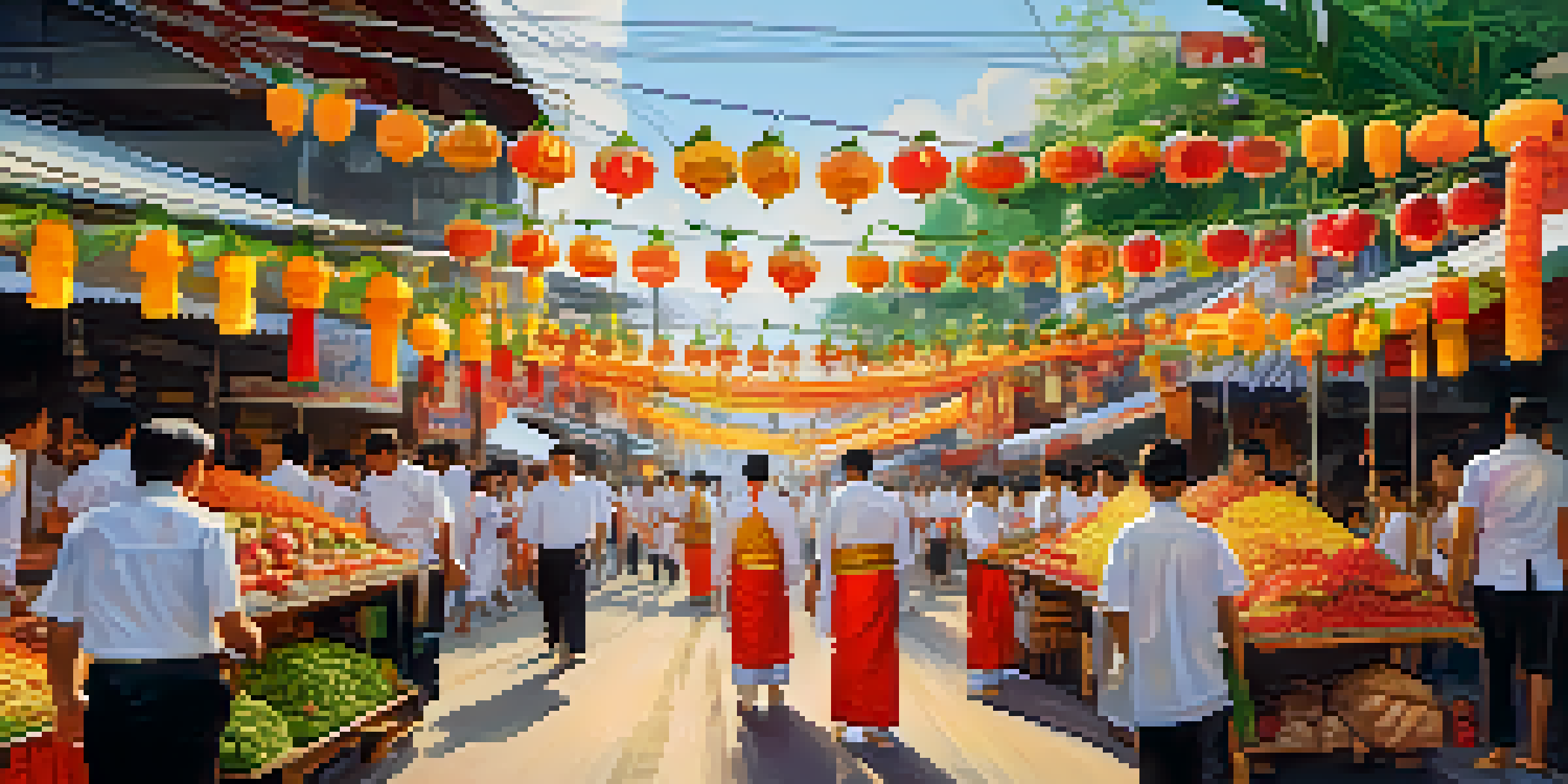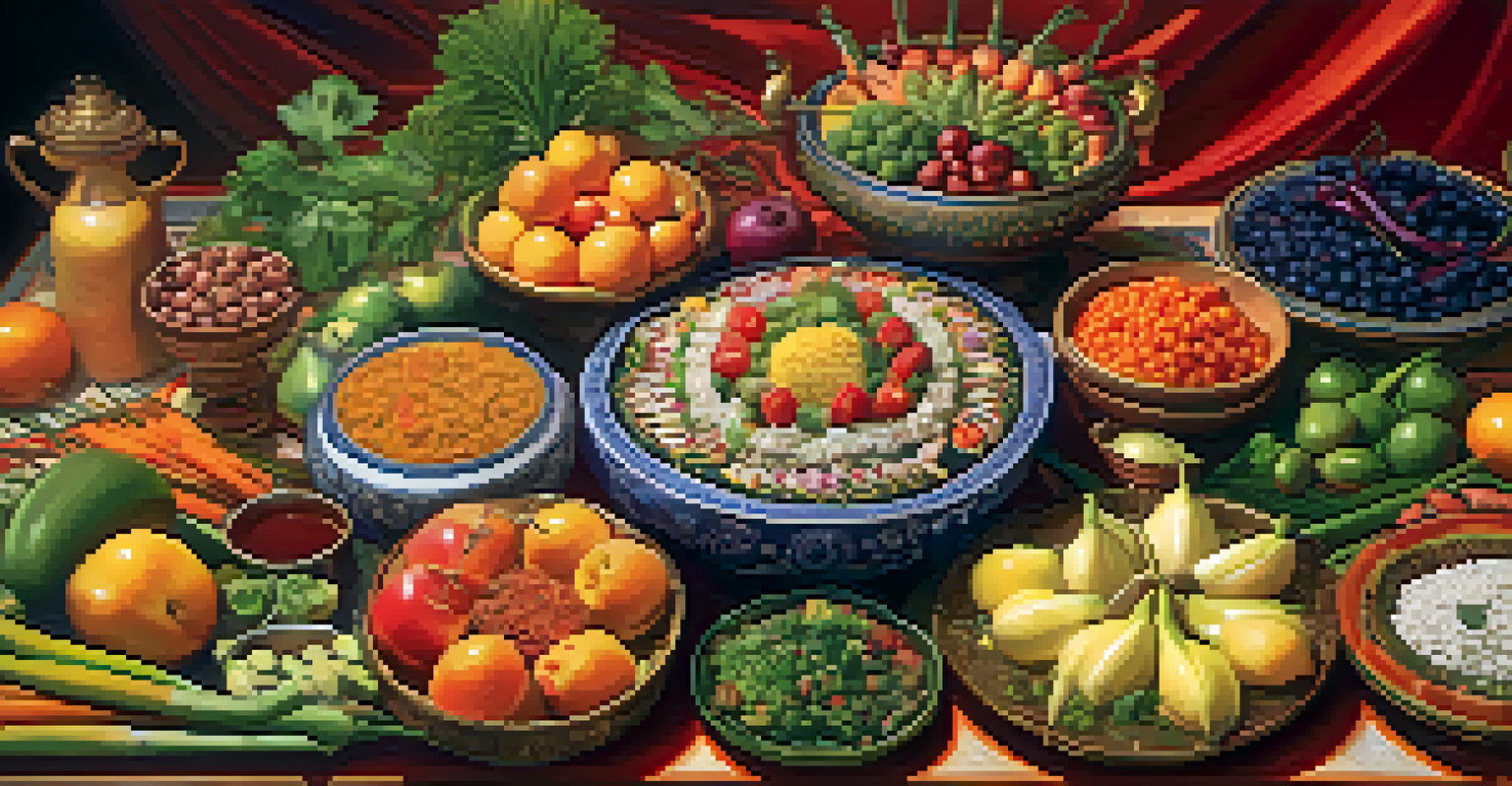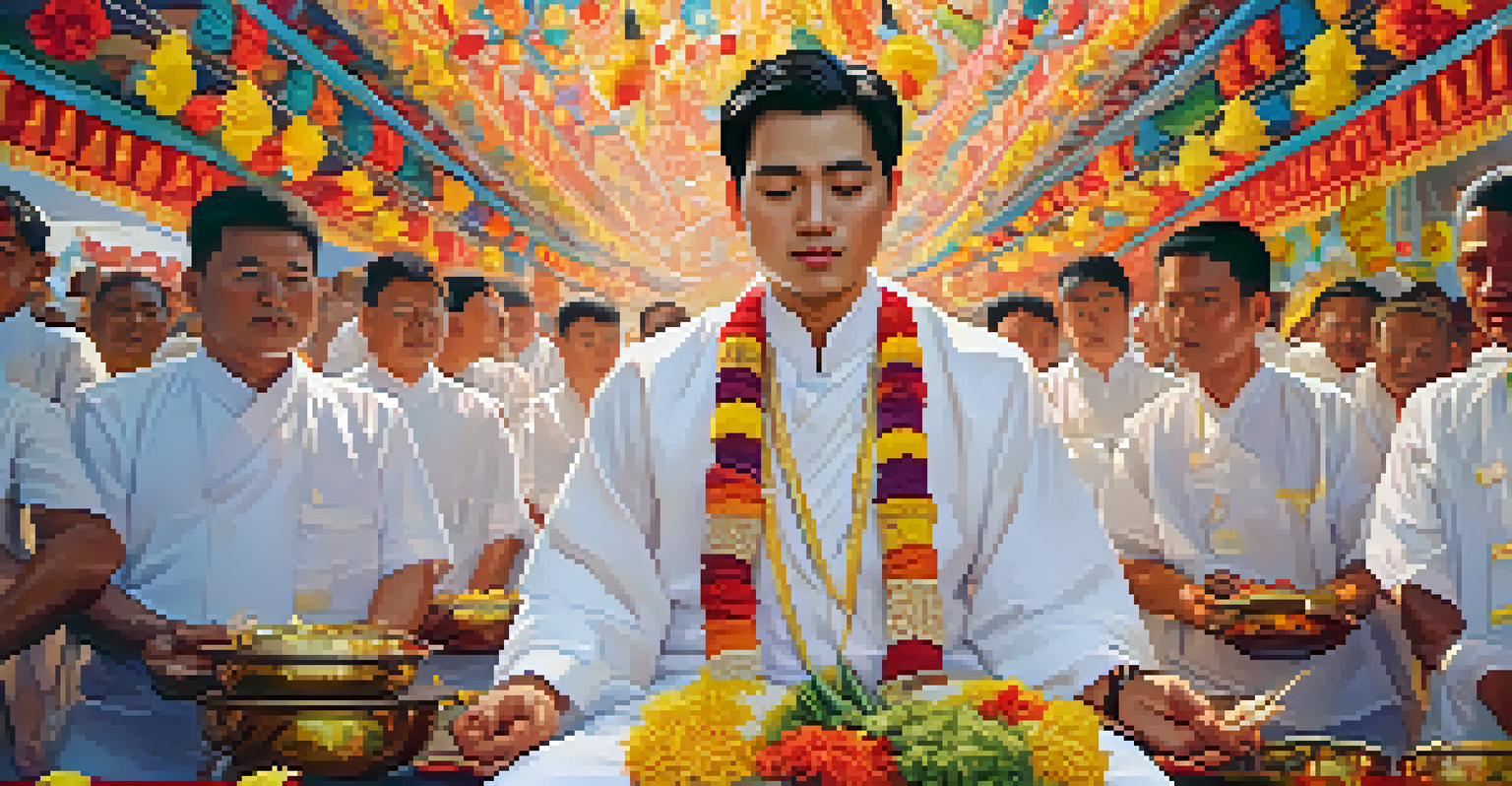The Cultural Significance of the Vegetarian Festival in Phuket

Understanding the Origins of the Vegetarian Festival
The Vegetarian Festival in Phuket has deep roots in Chinese culture, specifically among the Taoist community. It began in the early 19th century when a group of Chinese opera performers fell ill and sought healing through a strict vegetarian diet. This led to the establishment of a festival that honors both their ancestors and the deities of Chinese tradition, making it a unique blend of spirituality and cuisine.
Food is not just what we eat, but a reflection of our culture and beliefs.
As this festival grew in popularity, it became an integral part of Phuket's cultural landscape. Locals embraced the tradition, incorporating it into their own practices. Now, the festival is celebrated by people from all walks of life, transcending its initial ethnic boundaries and showcasing the island’s multicultural spirit.
The festival not only highlights the importance of vegetarianism for health and purification but also fosters a sense of community. Residents and visitors alike come together to partake in this vibrant celebration, creating bonds and reinforcing social ties that last far beyond the festival days.
Key Rituals and Practices of the Festival
One of the most striking aspects of the Vegetarian Festival is its rituals, which are both colorful and spiritually significant. Participants dress in white, symbolizing purity, and partake in various ceremonies that honor the gods. These rituals often include processions, prayers, and offerings of food, which are all integral to the celebration.

A notable feature of the festival is the practice of 'Ma Song,' or mediumship, where individuals enter a trance-like state to communicate with the divine. This can involve various acts, including self-mutilation, which may seem shocking but is seen as a form of spiritual cleansing. These acts are believed to bring about protection and blessings, illustrating the intense devotion of participants.
Cultural Roots of the Festival
The Vegetarian Festival in Phuket has its origins in 19th-century Chinese culture, blending spirituality and cuisine.
Food plays a central role during the festival, with a variety of vegetarian dishes offered at street stalls and restaurants. Traditional Thai dishes are prepared without meat, featuring vibrant vegetables and aromatic spices. This culinary aspect not only nourishes bodies but also serves to educate people about the benefits of a plant-based diet.
The Festival's Impact on Phuket's Community
The Vegetarian Festival has a significant impact on Phuket's local economy, attracting thousands of tourists each year. Hotels, restaurants, and local vendors benefit from the influx of visitors eager to experience the vibrant atmosphere and partake in the festivities. This boost in tourism helps sustain local businesses and provides jobs for residents, making the festival economically vital.
Festivals are the heartbeat of a community, bringing people together in celebration of shared values.
Beyond the economic benefits, the festival fosters a sense of pride among locals. It serves as a reminder of Phuket's rich cultural heritage and the importance of community. Residents take great pride in showcasing their traditions, welcoming visitors with open arms and sharing their stories, making the festival a celebration of identity and belonging.
Moreover, the festival encourages environmental awareness and health consciousness. As more people explore vegetarianism during this time, it sparks conversations about sustainable living and wellness. This ripple effect often leads to a lasting change in dietary habits, influencing both locals and tourists long after the festival concludes.
Symbolism of Colors and Offerings
Colors play a crucial role in the Vegetarian Festival, with participants predominantly wearing white to signify purity and renewal. Red, often associated with prosperity and good fortune, is also common as it attracts blessings. Each color has its own significance, creating a visually stunning spectacle that captivates both participants and onlookers.
Offerings during the festival, including fruits, vegetables, and incense, are made at altars to honor the gods and ancestors. These offerings symbolize gratitude and respect, showcasing the deep-rooted beliefs of the community. It’s a way for people to connect with their spiritual side while reinforcing cultural traditions.
Community and Economic Impact
The festival significantly boosts Phuket's economy while fostering pride and unity among locals.
The careful preparation of these offerings reflects the meticulous nature of the festival. Each dish is crafted with intention, highlighting the importance of mindfulness in both cooking and consumption. This attention to detail emphasizes the festival's core values of respect, community, and spirituality.
Culinary Delights: What to Expect
The Vegetarian Festival is a food lover's paradise, offering a plethora of delectable plant-based dishes. From spicy curries to intricate desserts, the culinary offerings showcase the diversity of Thai cuisine. Street vendors line the streets, tempting passersby with fragrant dishes that are both visually appealing and bursting with flavor.
Many local restaurants participate by creating special vegetarian menus that highlight their culinary skills. Traditional favorites are often modified to be meat-free, showcasing the creativity of chefs and the adaptability of Thai flavors. This innovation not only satisfies the taste buds but also introduces new culinary experiences to festival-goers.
Sampling these dishes is not just about filling your stomach; it’s an immersive experience that connects you to the culture. Each bite tells a story, reflecting the heritage and values of Phuket's people. By embracing this culinary journey, participants gain a deeper understanding of the festival's significance and its impact on the community.
The Role of Spirituality in the Festival
At its core, the Vegetarian Festival is a spiritual journey for many participants. It represents a time for reflection, purification, and devotion to the gods. Engaging in the various rituals allows individuals to connect with their spiritual beliefs and seek guidance in their lives.
For some, participating in the festival is a way to atone for past wrongdoings, making it a deeply personal experience. The act of abstaining from meat and indulging in vegetarian offerings signifies a commitment to living a more compassionate lifestyle. This spiritual renewal is often accompanied by a sense of peace and fulfillment.
Spiritual Significance and Mindfulness
At its core, the festival serves as a time for reflection and spiritual renewal, promoting compassion and interconnectedness.
The festival also serves as a reminder of the importance of mindfulness and respect for all living beings. By honoring the deities and ancestors, participants cultivate gratitude and a sense of interconnectedness with the world around them. This spiritual aspect elevates the festival from a mere celebration to a transformative experience.
Conclusion: A Celebration of Life and Culture
The Vegetarian Festival in Phuket is much more than a culinary event; it’s a celebration of life, culture, and spirituality. It brings together people from diverse backgrounds to partake in traditions that have been passed down through generations. The festival serves as a reminder of the importance of community, respect for nature, and connection to one’s roots.
As the festival continues to evolve, it remains a vital part of Phuket's identity, drawing attention to the island's rich cultural tapestry. By participating in the festival, both locals and visitors gain a greater appreciation for the values and beliefs that shape this vibrant community.

Overall, the Vegetarian Festival is a beautiful expression of devotion, creativity, and togetherness. It invites everyone to join in the festivities, fostering a spirit of unity and understanding that transcends cultural boundaries. Whether you're a seasoned participant or a curious newcomer, this festival is an experience not to be missed.